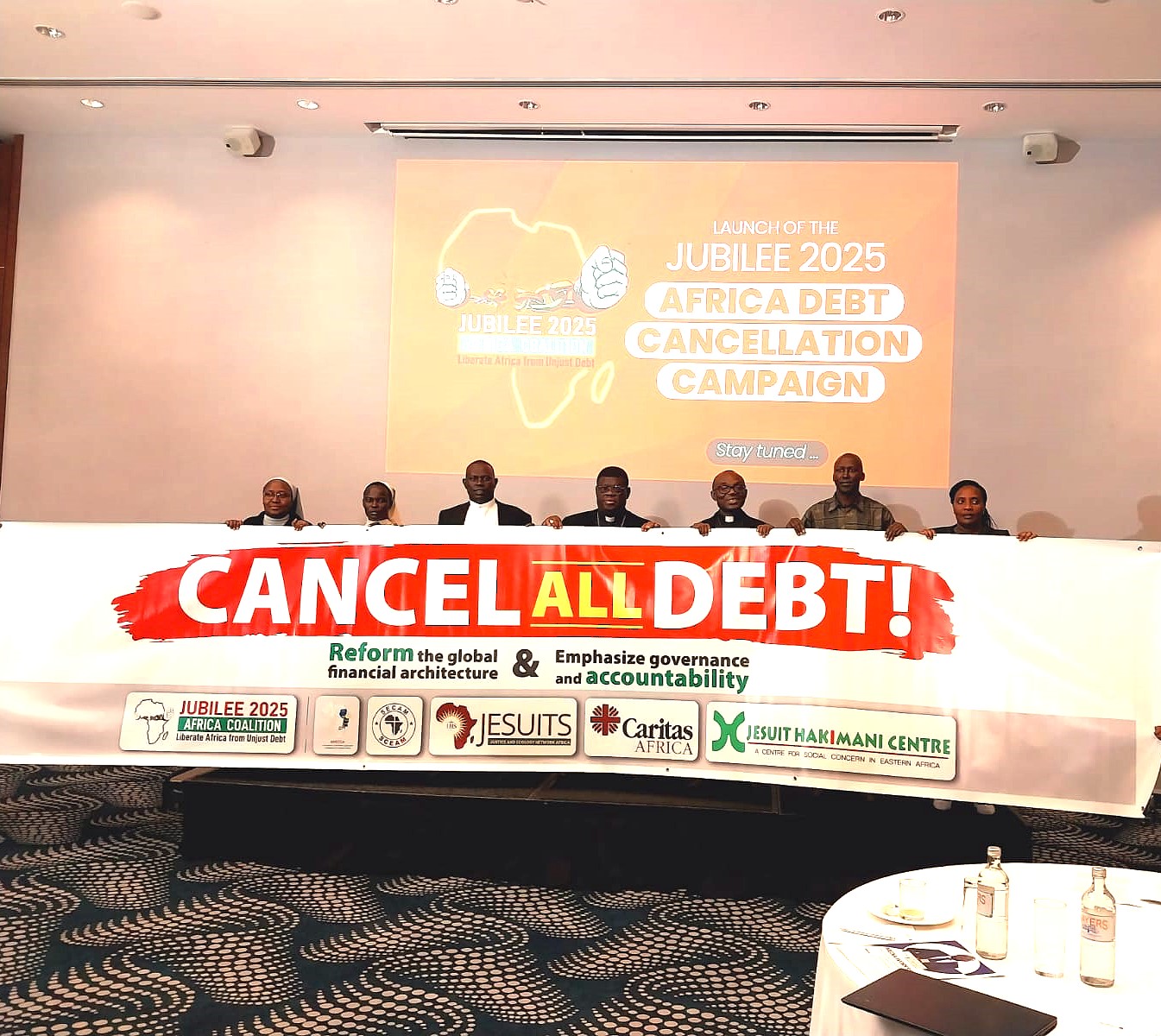
The Association of Member Episcopal Conferences in Eastern Africa (AMECEA), the Jesuit Justice and Ecology Network Africa (JENA), in collaboration with Caritas Africa and the Symposium of Episcopal Conferences of Africa and Madagascar (SECAM), have launched the Jubilee 2025 Debt Cancellation Campaign in Nairobi.
This bold initiative, inspired by Pope Francis’s call for a Jubilee Year, seeks to mobilize action across Africa for the cancellation of unjust debts and advocate for reforms in the global financial architecture.
The campaign is rooted in the Catholic Church’s enduring commitment to social justice, drawing from the theological foundations of the Jubilee Year as a time of renewal, hope, and liberation. The 2025 theme, “Pilgrims of Hope,” underscores a global call for economic justice, equity, and the protection of the most vulnerable communities.
Speaking today during the launch, Bishop Charles Kasonde, Chairman, AMECEA said the Jubilee 2025 Debt Cancellation Campaign extends beyond debt cancellation as we seek comprehensive global financial reforms aimed at preventing the cycles of debt entrapment that have plagued our nations. Additionally, we advocate for responsible borrowing and lending practices that uphold justice and equity.
“Our vision for Jubilee 2025 is to see an Africa liberated from the constraints of unjust debt, thriving within a fair global financial system, and strengthened by ethical leadership and robust governance,” he said.
Kasonde noted that Africa’s external debt has soared to over $1 trillion, a staggering increase driven by high-interest loans, volatile commodity prices, and a plethora of external shocks, including the aftermath of the COVID-19 pandemic. As a result, many nations find themselves in a dire fiscal situation, where debt servicing costs consume over 50 per cent of national revenues. This crippling reality severely limits our ability to invest in critical sectors such as healthcare, education, and climate resilience.
The International Monetary Fund and World Bank have classified numerous African nations as being either in debt distress or at risk of default, creating a precarious balance between necessary expenditure and crippling debt obligations. Some of the nations facing this grim reality are Zambia, Ghana, Ethiopia, Chad, Somalia, Sudan and Malawi
Speaking on the same, Fr. Charles Chilufya, S.J – Director Jesuits Justice and Ecology Network Africa (JENA) averred that “Debt is not just an economic issue; it is a moral. The burden of unjust debt undermines the dignity of millions, stifles development, and traps nations in cycles of poverty. The Church, guided by Pope Francis’s vision, stands in solidarity with those affected, advocating for a more just and compassionate financial system.”
The Jubilee 2025 Africa Campaign builds on the historic success of the Jubilee 2000 Campaign, a global movement spearheaded by faith-based organizations, including the Catholic Church. That campaign achieved significant victories, resulting in over $100 billion in debt relief for some of the world’s poorest countries, including Uganda, Mozambique, and Tanzania. This debt cancellation enabled countries to invest in critical sectors such as health, education, and infrastructure, dramatically improving the lives of millions.
“Jubilee 2000 showed us the power of global solidarity. It was proof that when faith communities, civil society, and governments unite, transformative change is possible,” said Fr. Kayanda S.J., Director Jesuit Hakimani Center. “Now, as we face new debt crises, especially in Africa, Jubilee 2025 seeks to reignite that spirit of hope and action.”
According to recent data, Africa is at a critical crossroads with over 22 African countries either in debt distress or at high risk. The COVID-19 pandemic, coupled with global economic shocks, has exacerbated the situation, leaving nations struggling to meet basic needs while servicing unsustainable debts. The Jubilee 2025 Debt Cancellation Campaign highlights how these debts, often incurred under unfair conditions, perpetuate inequality and hinder sustainable development.
Through advocacy, community mobilization, and partnerships with civil society and governments, the Catholic Church and its partners aim to secure the cancellation of unjust debts that undermine human dignity and development. Furthermore, it aims to promote reforms in the global financial system to ensure fairness, accountability, and sustainability. Lastly, the church also seeks to raise awareness about the moral and ethical dimensions of debt through education, media engagement, and grassroots campaigns.







